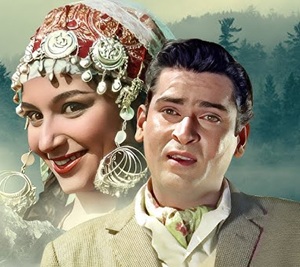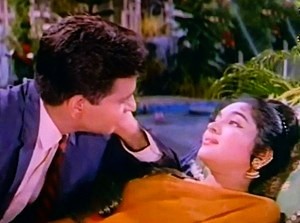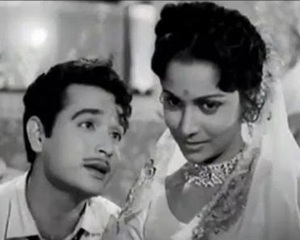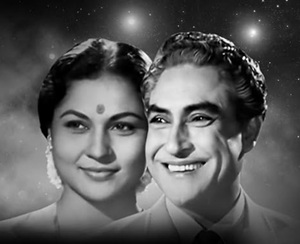Feb 24, 2026
Feb 24, 2026
The 1960s – Golden Years – Part 11
Entertainers (Continued)
 K. Shankar’s Raj Kumar, written by Ramanand Sagar, and Shakti Samanta’s Kashmir Ki Kali were tailor-made for Shammi Kapoor’s acting style. Raj Kumar was a costume drama starring Sadhana as the heroine, while Kashmir Ki Kali was set in Kashmir, marking Sharmila Tagore's debut in Hindi films. Shankar Jaikishan in Raj Kumar and OP Nayyar in Kashmir ki kali regaled us with some memorable songs like Mohammed Rafi’s Tumne kisi ki jaan ko jaate huwe dekha hai and Is rang badalti duniya mein and the Mohammed Rafi and Suman Kalyanpur’s duet Tumne pukara aur hum chale aaye from Raj Kumar, and Mohammed Rafi’s solos, Kisi na kisi se kabhi na kabhi, Taarif karoon kya uski, Subhanallah haseen chehra, Hai duniya usiki zamana usika, Mohammed Rafi and Asha Bhonsle’s duets Isharon isharon mein dil lenewale and Deewana hua badal, from Kashmir ki kali lifted these two films to the fifth and sixth highest grossing films of 1964.
K. Shankar’s Raj Kumar, written by Ramanand Sagar, and Shakti Samanta’s Kashmir Ki Kali were tailor-made for Shammi Kapoor’s acting style. Raj Kumar was a costume drama starring Sadhana as the heroine, while Kashmir Ki Kali was set in Kashmir, marking Sharmila Tagore's debut in Hindi films. Shankar Jaikishan in Raj Kumar and OP Nayyar in Kashmir ki kali regaled us with some memorable songs like Mohammed Rafi’s Tumne kisi ki jaan ko jaate huwe dekha hai and Is rang badalti duniya mein and the Mohammed Rafi and Suman Kalyanpur’s duet Tumne pukara aur hum chale aaye from Raj Kumar, and Mohammed Rafi’s solos, Kisi na kisi se kabhi na kabhi, Taarif karoon kya uski, Subhanallah haseen chehra, Hai duniya usiki zamana usika, Mohammed Rafi and Asha Bhonsle’s duets Isharon isharon mein dil lenewale and Deewana hua badal, from Kashmir ki kali lifted these two films to the fifth and sixth highest grossing films of 1964.
Hindi films made in South India continued to do good business, led by Gemini film’s Zindagi, followed by LV Prasad’s Beti Bete, AC Trilok Chander’s Main Bhi Ladki hoon and AVM’s Pooja ke Phool.
Zindagi, directed by Ramanand Sagar, starring Rajendra Kumar, Vyjayantimala, Raaj Kumar, and Prithviraj Kapoor, is a romantic drama with music composed by Shankar Jaikishan. The film relates the struggles of a poor dancer, wooed by the scion of a rich landlord, proud of his prestige. Some of the songs, like Mohammed Rafi’s Pehle mile the sapnon mein, and Manna Dey’s Muskura laadle muskura were popular.
Beti Bete is the story of siblings separated as children and reunited when they grow up. It starred Sunil Dutt, B Saroja Devi, Jamuna, Mahmood and Shubha Khote and had music by Shankar Jaikishan. Mohammed Rafi’s solos, Aaj kal mein dhal gaya and Radhike tune bansari churai became popular.
Main Bhi Ladki hoon tells the story of a girl facing discrimination due to her dark complexion. Meena Kumari plays another tear-jerking role as the dark girl, co-starring Dharmendra, Balraj Sahni, and Om Prakash. A remake of the Tamil film, Nanum Or Penn, the film had music by Chitragupt. Lata Mangeshkar’s Krishna, oh kaale krishna and her duet with Kannada singer PB Srinivas, Chanda se hoga woh pyara scaled the charts.
Pooja ke Phool, directed by A Bhimsingh, and starring Ashok Kumar, Dharmendra, Mala Sinha, Nimmi and Pran, is a dramatic film about love and sacrifice, with music by Madan Mohan. It is a remake of Telugu film Manchi Manasulu. Lata Mangeshkar’s Meow meow meri sakhi, Meri aankhon se koi and Mohammed Rafi and Asha Bhonsle’s duets, Ab do dilon ki mushkil aasan ho gayi hai, and Hey jamaalo, were popular.
 Sashadhar Mukherjee’s Leader, written by Dilip Kumar and directed by Ram Mukherjee, starred Dilip Kumar and Vyjayantimala and had music by Naushad. It was not as successful as Dilip Kumar’s earlier films. I remember it mainly for Motilal’s acting as a senior politician and the songs, Apni azadi ko hum, and Mujhe duniya walon sung by Mohammed Rafi, Asha Bhonsle’s Daiya re daiya, and the duets, Tere husn ki kya tareef karoon, and Ek shahenshah ne banwa ke haseen taj mahal, sung by Mohammed Rafi and Lata Mangeshkar.
Sashadhar Mukherjee’s Leader, written by Dilip Kumar and directed by Ram Mukherjee, starred Dilip Kumar and Vyjayantimala and had music by Naushad. It was not as successful as Dilip Kumar’s earlier films. I remember it mainly for Motilal’s acting as a senior politician and the songs, Apni azadi ko hum, and Mujhe duniya walon sung by Mohammed Rafi, Asha Bhonsle’s Daiya re daiya, and the duets, Tere husn ki kya tareef karoon, and Ek shahenshah ne banwa ke haseen taj mahal, sung by Mohammed Rafi and Lata Mangeshkar.
Raj Khosla’s Woh Kaun Thi was a mystery thriller starring Manoj Kumar, Sadhana, and Prem Chopra. It is remembered as much for Raj Khosla’s direction as Madan Mohan’s music. The haunting strains of Lata Mangeshkar’s Naina barse rim jhim rim jhim and lag jaa gale and soulful Aap kyun roye are unforgettable.
 Kohra was the remake of Rebecca, based on Daphne Du Maurier’s novel of the same name. Directed by Biren Nag, the film starred Biswajit Chatterjee and Waheeda Rehman. Hemant Kumar’s music adequately supported the theme of the movie. With Kaifi Azmi’s lyrics, Lata Mangeshkar’s haunting Jhoom jhoom dhalti raat, Hemant Kumar’s Yeh nayan dare dare, and Rah bani khud manzil are still popular with lovers of Hindi film music. Lata Mangeshkar's O beqarar dil is the Hindi version of O nodi re, one of my favourite Bengali songs composed by Hemant Kumar for Neel Akasher Neeche in 1959. It was also featured in the 1972 English film Siddhartha, starring Shashi Kapoor and Simi Grewal.
Kohra was the remake of Rebecca, based on Daphne Du Maurier’s novel of the same name. Directed by Biren Nag, the film starred Biswajit Chatterjee and Waheeda Rehman. Hemant Kumar’s music adequately supported the theme of the movie. With Kaifi Azmi’s lyrics, Lata Mangeshkar’s haunting Jhoom jhoom dhalti raat, Hemant Kumar’s Yeh nayan dare dare, and Rah bani khud manzil are still popular with lovers of Hindi film music. Lata Mangeshkar's O beqarar dil is the Hindi version of O nodi re, one of my favourite Bengali songs composed by Hemant Kumar for Neel Akasher Neeche in 1959. It was also featured in the 1972 English film Siddhartha, starring Shashi Kapoor and Simi Grewal.
Biswajit had another success in Subodh Mukherji’s April Fool, a romantic comedy in which his co-star was Saira Banu. Shankar-Jaikishan's tunes, April fool banaya sung by Mohammed Rafi and Unki pehli nazar sung by Lata Mangeshkar were hits.
Devendra Goel’s Joy Mukherjee, Saira Banu starrer, Door Ki Awaz is remembered for Hum bhi agar bachche hote, the evergreen birthday song, filmed on Johnny Walker, composed by Ravi, and sung by Mohammed Rafi.
Sharabi is a drama film directed by Raj Rishi and starring Madhubala and Dev Anand. The film tells the story of a man’s obsession with alcohol. Sharabi was Madhubala's last film released in her lifetime. The film was started in 1958 but could be released only in 1964 because of Madhubala’s health. Kabhi Na Kabhi Kahin Na Kahin, sung by Mohammed Rafi, is one of Madan Mohan’s best compositions. Madan Mohan gave some good music in two other less successful films, Ghazal and Jahan Ara.
Ghazal is a Muslim social film directed by Ved Madan starring Sunil Dutt and Meena Kumari. With Sahir Ludhianvi’s lyrics, Madan Mohan composed the unforgettable ghazals Naghma O Sher Ki Saugaat by Lata Mangeshkar, and Ishq Ki Garmiye Jazbaat, Rang Aur Noor Ki Baraat, and Taj tere liye ek mazhar-e-ulfat hi sahi, by Mohammed Rafi.
Directed by Vinod Kumar, Jahan Ara recalls a little-known, ill-fated romance between Princess Jahan Ara, daughter of Moghul Emperor Shah Jahan, and a court poet. Mala Sinha and Bharat Bhushan played the leading roles. In a year in which the dominant male playback voice was that of Mohammed Rafi, Madan Mohan brought back Talat Mehmood to render some memorable soulful ghazals, Teri aankh ke aansoo, Main teri nazar ka saroor hoon, and Phir wohi sham. Bad muddat ke yeh ghadi aayee hai a duet by Mohammed Rafi and Suman Kalyanpur was also a good composition.
Shagoon, directed by Nazar, stars Waheeda Rehman and Kamaljeet. The film is about the belief that people with the aspect of Mars in their birth horoscopes, known as mangli, bring bad luck. The film had music by Khayyam with lyrics by Sahir Ludhianvi, creating memorable songs like Parbaton ke pedon par sung by Mohammed Rafi and Suman Kaalyanpur and Tum apna ranj-o-gham by Jagjit Kaur.
They also ran
Gehra Daag, produced and directed by Rajendra Kumar’s brother-in-law, OP Ralhan, was the story of a man who goes to jail for killing a fellow student to protect his sister, and his struggle to outlive his past. Mala Sinha was cast opposite Rajendra Kumar, and Ravi provided music for the film.
 Grahasti, starring Ashok Kumar, Nirupa Roy, Manoj Kumar, Mehmood, Rajshri, Indrani Mukherjee, and Shubha Khote, was directed by SS Vasan with music by Ravi. Grahasti is a family drama in which Ashok Kumar played a respected industrialist with a large, happy family. On the occasion of his daughter’s engagement, he is found to be leading a dual life, having two sets of families in different cities. The effect the scandal and the secret have on him and his family forms the basis of the film. The film was inspired by a true story, which became a Broadway play called The Remarkable Mr. Pennypacker in 1953 and an American film starring Clifton Webb and Dorothy McGuire in 1959. Asha Bhosle's Jeevan jyot jale won the Mian Tansen Award.
Grahasti, starring Ashok Kumar, Nirupa Roy, Manoj Kumar, Mehmood, Rajshri, Indrani Mukherjee, and Shubha Khote, was directed by SS Vasan with music by Ravi. Grahasti is a family drama in which Ashok Kumar played a respected industrialist with a large, happy family. On the occasion of his daughter’s engagement, he is found to be leading a dual life, having two sets of families in different cities. The effect the scandal and the secret have on him and his family forms the basis of the film. The film was inspired by a true story, which became a Broadway play called The Remarkable Mr. Pennypacker in 1953 and an American film starring Clifton Webb and Dorothy McGuire in 1959. Asha Bhosle's Jeevan jyot jale won the Mian Tansen Award.
Meri Surat Teri Aankhen, directed by RK Rakhan, starring Ashok Kumar, Asha Parekh and Pradeep Kumar, is based on Ulka, a Bengali novel by Nihar Ranjan Gupta. It relates the story of a child, abandoned by his father for not being good-looking, who grows up to be an accomplished musician. SD Burman’s music for the film was a plus point. Poochho na kaise maine rain bitaayi sung by Manna Dey, Naache man moraa magan dhigadhaa dhigi dhigi sung by Mohammed Rafi are evergreen songs.
Bahurani was based on the Bengali novel Swayamsiddha written by Manilal Banerjee. An earlier version of the film was released in 1949. The book was translated into Telugu and filmed as Ardhangi in 1955 and remade as Bahurani in 1963. It relates the story of a child neglected by his stepmother and addicted to opium. Growing up as an underdeveloped boy, he is married to a no-nonsense village girl, who puts everyone right, and cures him. Directed by T Prakash Rao, the film starred Guru Dutt, Mala Sinha, and Feroz Khan. C Ramchandra composed music for the film. Eetal ke ghal me teetal sung by Hemant Kumar and Balma anadi man bhaye by Lata Mangeshkar were popular.
Bharosa was also remade from a Telugu film, BR Pantulu’s Galimedalu (1962). A rich man down with TB loses hope and leaves his village, entrusting his only son to a friend with enough funds for his education. The “friend” treats the child as a menial and misuses the money to build up a business and educate his own son. The film starred Guru Dutt, Asha Parekh, and Mehmood with music by Ravi. Aaj ki mulaqat bas itni, a duet by Mahendra Kapoor and Lata Mangeshkar, and Lata Mangeshkar’s solo Who kahan se laun were popular numbers.
Parasmani, directed by Babubhai Mistri, is a musical fantasy. Music directors Lakshmikant Pyarelal made their debut with hits like Hansta hua noorani chehra, sung by Lata Mangeshkar and Kamal Barot, Roshan tumhi se duniya, sung by Mohammed Rafi, and their duet Woh jab yaad aaye.
Unlike most debutant music directors, Lakshmikant Pyarelal got a series of assignments in quick succession. In 1963, they scored music for another film, Harischandra Taramati and in 1964, they had five releases, of which the music of three films, Sant Gyaneswar, Dosti, and Mr X in Bombay was very popular. Sant Gyaneswar, was a biographical film about the great Maharastrian saint, directed by Manibhai Vyas. Lata Mangeshkar’s Jyot se jyot jagaate chalo was also sung by Mukesh, and her other solo, Ek do teen char bhaiya bano hoshiyar were popular, as was the bhajan Jai jai ram krishna hari. In the mystery thriller Mr X in Bombay starring Kishore Kumar and Kumkum, Kishore Kumar’s Mere mehboob qayamat hogi was a big hit.
Sehra, produced and directed by V Shantaram, was a tragic love drama based in Rajasthan starring Sandhya and a newcomer called Prashant with music by Ramlal. Pankh hoti tho ud jati re sung by Lata Mangeshkar was a major hit. Cinematographer Krishnarao Vashirde won the Filmfare Award for Best Colour Cinematography.
V Shantaram’s Geet gaya patharon ne marked the debut of Shantaram’s daughter Rajashri and Jitendra, destined to be one of the most successful actors in Hindi films. The film is about a struggling sculptor and his romance with a dancer. Geet gaya patharon ne, sung by Kishori Amonkar, Mahendra Kapoor and Asha Bhonsle, Aaja janejan and Tere khayalo me, sung by Asha Bhonsle, tuned by music director Ramlal, were popular. CH Atma sang a popular number Ho saath agar mandave tale garib ke.
07-Jun-2025
More by : Ramarao Annavarapu

|
Great memories. Keep 'em coming !! |